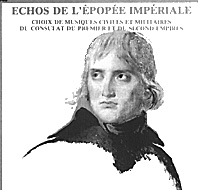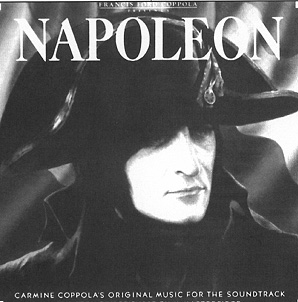
When one considers the legacy of the Napoleonic era, music is often overlooked. Yet this period produced some rather stirring and remarkable music. Whether it is the patriotic strains of "La Marseillaise," or the reflection of imperial glory in "La Victoire et a Nous," music of the epoch reflects the rich and exciting history of the period.
 It must be remembered, however, that the
recordings available today will not sound
exactly like the music did during the actual
period. The instruments have changed, and
often the music has been re-scored to reflect
more modern tastes and expectations. That
fact not withstanding, music of the period can
be a real delight.
It must be remembered, however, that the
recordings available today will not sound
exactly like the music did during the actual
period. The instruments have changed, and
often the music has been re-scored to reflect
more modern tastes and expectations. That
fact not withstanding, music of the period can
be a real delight.
There has also been some written music in recent times that is meant to reflect the events of the period. Some of this is as interesting to listen to as music from the actual period.
The following list is offered, more or less in order of my personal preference, of the best music on compact disc (CD) to come out of or to reflect the Revolutionary and Napoleonic periods.
Traditional Selections
Les Marches Napoleoniennes: Sept Barreries de Tambours Neuf Ordonnances des Fifres et Tambours de la Garde Imperial Douze Marches et Chansons, La Musique du 43e R.I. de Lille, sous la direction du commandant Philibert. 1987, Disques Deesse, Paris. Distribution: CBS. 276-2 CD.
Each of these 27 items are verbally announced (e.g., "Pour l'Empereur"). The renditions are excellent, and this is a must for anyone with the slightest interest in Napoleonic music. Notes, in French, regarding several of the major selections are included.
Echos de l'Epopee Imperiale: Choix de Musiques Civiles et Militaires du Consulat du Premier et du Deuxieme Empires, Edite pour le cinquantieme Anniversaire de la Fondation du "Souvenir Napoleonien" par Eugenie Galle 21 Decembre 1937.1988 SERP, 08 88 CMC 70048.
Most of the 41 selections are performed by the Garde Republicaine de Paris, though several are performed by other notable groups. The notes include an introduction by Baron Gourgaud, President du Sounvenir Napoleonien and provides information about his organization as well as information on several of the more important selections. Incidentally, the CD itself has David's unfinished portrait of Napoleon on it.
Marc Ogeret Chante la Revolution, 1988, SACEM, SOAC Disc, Granit, 882002 CD.
Marc Ogeret sings 21 songs of the French Revolution in a style faithful to the period. This is the finest disc of French Revolutionary music that I have heard. Extensive notes give the background and context of the various songs. His rendition of "La Marseillaise" is, in my opinion, far better than the usual operatic versions based on Berlioz.
Chants de France, Ecole Militaire Interarmes: Promotion Capitaine Barres, 1992-1993. 1993 SERP CMC 7114 SL 888. Compact disc.
Eighteen choral numbers are performed in French, six of which are described and the words listed in the notes (French text). The music comes from several different periods in French history, and is quite moving. You probably have nothing quite like this in your collection.
Revolution Francaise, Choeurs et Orchestre du Capitole de Toulouse. 1988, EMI Digital, CDC 7 49470 2.
Many of the selections are similar to those in the following disc. Of special interest is the renditon of "Le Chant du Depart," which I consider to be one of the greatest songs to come out of the Revolution. The notes include English translations. The words for each of the eight selections are also included, although only in French.
Revolution Francaise, Choeurs de l'Armee Francaise, Orchestre de la Garde Republicaine, et Mireille Mathieu (dans "La Marsellaise").1988, EMI Digital CDC 7 49473 2 PM 518.
This disc contains 23 selections mainly associated with the French Revolution, but also including material that would have been used in the Napoleonic period. The renditions are excellent. The notes include the text of the Declaration des Droits de l'homme et du Cityoen, as well as information on the Garde Republicaine.
Musique de la Revolution Francaise, Orchestre de La Musique Municipale de Bordeaux.1987, Harmone, Cybelia, CY 825 DS 813.
A nice renditon of the traditional music of the Revolution. The notes are in French, English and German, and are quite useful, as each of the twelve selections is discussed.
Le Bal des Citoyens: danses et contredanses de la Revolution, 1789, Ensemble Orchestral de Marseille. ADDA Fonti Musicali 581105.
Produced by the Consevatiore national de Region de Marseille in July and September of 1988. This compact disc features 24 dances popular from 1789 to 1800. The extensive notes in both French and English provide fascinating information.
Non-traditional Selections
Il n'etait Qu'une Fois: la Revolution, Orchestre Regional de Jazz. 1988 SACEM ORJC 001.
This unique and rare disc was produced to celebrate the revolutionary role played by the Dauphine, and was part of the bicentennial celebration of the region. It was produced by the minister of culture in Grenoble among others. The music itself is a jazz rendition based on the Revolutionary music, and it is wonderful. No notes accompany the CD, but the record version contains text and other information.
La Revolution Francaise, Performed in 1973 and released in 1987, Vogue, SACEM VG 651600 146.
This is a rock opera about the French Revolution by a French group that was very popular at the time (the French version of The Who, if you will). The music is stirring, the characterizations of the participants (Louis XVI, Robespierre, Talleyrand, Danton, Napoleon, et al) fascinating (and reasonably accurate), and the story of the Revolution is told through the eyes of a love-struck couple, one from the streets of Paris and the other from the Royal staff; compelling. A great deal of fun mixed in with history.
 Napoleon: Carmine Coppola's original Music
for the Sound track of Abel Gance's 1927 Film
masterpiece, CBS Records MK 37230.
Napoleon: Carmine Coppola's original Music
for the Sound track of Abel Gance's 1927 Film
masterpiece, CBS Records MK 37230.
Almost all of the original music composed for the classic 1927 silent film by Abel Gance has been lost. Kevin Brownlow spent twenty years piecing together the film. When Francis Ford Coppola decided to produce the film, he had his father compose a complete score to accompany the four hour film. The result is stirring music evocative of the era, as well as an important contribution to cinematic history.
Musique pour Napoleon d'Abel Gance/ Soundtrack for Abel Gance's Napoleon, Erato Disques (1994) 4509-94813-2.
When Abel Gance produced his classic 1927 film, an original score was composed by Arthur Honegger. Only twenty minutes of that original score have survived. One of his pupils, Marius Constant, composed new music that used those twenty minutes as a basis for a two hour symphonic work that follows the story of the movie. Much of the symphony evokes themes from the period, and is worth a place in a collection of Napoleonic music.
About the author: J. David Markham, M.A., M.Ed., is an educator and Napoleonic scholar. He has written numerous papers on Napoleonic topics that have appeared in French, British, and American publications. He is Vice President of the Napoleonic Society of America and a Fellow of the International Napoleonic Society.
Back to Table of Contents -- Napoleon #1
Copyright 1995 by Emperor's Press.